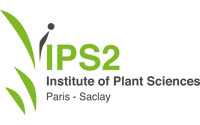PhD defences at IPS2 at the end of 2021
Hsin-Ya HUANG
Transposon insertion in an ethylene signaling gene leads to sex transition in melon
Keywords: C. melo, Sex determination, Androecy, Ethylene, Transposable elements, Transcriptome.
How the gender of a flower or plant is determined is an important issue in plant developmental biology. In melon, sex determination is governed by three genes andromonoecious (M), androecious (A) and gynoecious (G). The interplay of alleles of these three genes results in a range of sexual types. By producing a mutagenized collection (EMS) from an andromonoic melon line and screening for sex transition mutants, we identified an androecious sex transition recessive mutant (a2). Using a positional cloning approach combining NGS bulked segregant analysis sequencing and fine mapping, a2 was delimited to a single gene, encoding an ethylene signaling protein. In the mutant GSN106, an insertion of a DNA transposon of the PIF/Harbinger family (AndroPIF), was found inside the 5’ UTR of the a2 gene. Using epistasis analysis, we positioned A2 in the sex determination pathway. Transcriptomics of the wild-type and a2 loss of function mutant shows that ethylene both inhibits stamen and promotes carpel development.
November 25, 2021
Thesis supervisor: Abdelhafid Bendahmane
Gwilherm BRISOU
Identification and characterization of mutations conferring resistance to heat stress in Arabidopsis, toward application to crop species
Keywords: Positional cloning, abiotic stress, translational genetics, Arabidopsis, tomato.
In agriculture, abiotic stresses lead to severe yield losses. Moreover, the climate change is predicted to increase the frequency and the intensity of extreme weather events. One of the most urgent challenges of agriculture is to improve crop resilience to heat stress to guarantee yield stability. This thesis project is part of the collaboration between IPS2 and Gautier Semences (CIFRE contract). Previously, an EMS-mutagenized Arabidopsis mutant population was created in the laboratory. During his PhD within the FLOCAD team at IPS2, Gwilherm BRISOU performed the positional cloning of the constitutive stress resistance 1 Arabidopsis mutant. Using an integrative approach of genetic, molecular biology and physiological approaches, he performed a deep characterization of this mutant. Then, by performing a translational biology approach, he discovered new genes involved in abiotic stress tolerance in tomato, which could be useful to create new crop varieties performing better in the field.
December 2, 2021
Thesis supervisors: Dr. Abdelhafid Bendahmane & Dr. Heribert Hirt
Houda HENCHIRI
Description and functional analysis of the t-SNARE SNAP33 protein in Arabidopsis thaliana
Keywords: SNAP33, MAPK, stress, phytohormones, Arabidopsis, immunity.
Plant SNARE proteins (soluble N-ethylmaleimide-sensitive factor attachment protein receptors) are involved in vesicular trafficking in several processes and contribute to cellular homeostasis, immunity, growth and development. Within this gene family, SNAP33 codes for a t-SNARE protein (target-SNARE) involved in the fusion of vesicles to the plasma membrane during cytokinesis and immunity. This work enabled the identification of molecular pathways responsible for the dwarf and necrotic phenotype of the snap33 mutant.
December 8, 2021
Thesis supervision: Bénédicte Sturbois and Jean Bigeard
Rachid BOUMLIK
Towards understanding the molecular networks controlling inflorescence development in tomato (Solanum lycopersicum)
Keywords: Solanum lycopesicum, inflorescence architecture, flower abscission zone.
MADS-box transcription factors play a major role at all stages of plant development. The objective of Mr. Boumlik's thesis, as part of the FLOCAD team at IPS2, was to understand the molecular networks controlling inflorescence development in tomato. Through this study, R. Boumlik provided new knowledge that can be exploited by breeders to improve traits that have a direct impact on tomato yield and quality.
December 17, 2021
Thesis supervisors: Dr. Abdelhafid Bendahmane and Dr. Victoria Gomez

Mise en ligne le 16/02/2022
